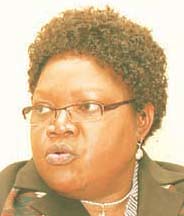
Republic of Zimbabwe Vice-President Joice Mujuru of the ZANU-PF party. Mujuru recently paid tribute to the nations of the Southern African Development Community (SADC) for their ongoing support for the country., a photo by Pan-African News Wire File Photos on Flickr.
NRZ monopoly to end, says Mujuru
Monday, 16 May 2011 22:20
Zimbabwe Herald
Bulawayo Bureau
Government is working on opening up the rail services and rail transport system to other players, Vice-President Joice Mujuru has said.
VP Mujuru said the performance of the railway sub-sector had declined over the past decades due to capacity constraints and lack of funding among other reasons.
In a speech read on her behalf by the Mayor of Victoria Falls, Councillor Nkosilathi Jiyane, at the Infrastructure Development Forum awards dinner in Victoria Falls last Thursday, Vice-President Mujuru said: "The Government is currently reviewing the regulatory framework governing rail transport with a view to establish a regulatory authority for the sub-sector.
"The rail transport system will be opened for strategic partnerships in rail construction, while rail services will be opened to the private sector."
In November last year, Transport, Communications and Infrastructural Development Minister Mr Nicholas Goche told parliamentarians that Government also had an option to put on concession some sections of the railway tracks to restore viability.
He said a policy was being put in place to achieve that while a body to operate the infrastructure could also be put in place to allow participation of more players for a fee.
He said this would ensure that the NRZ's more than 3 000 kilometres of rail track and extensive signaling and telecommunications systems would be put to full use.
The World Bank once recommended that the NRZ should close down two thirds of its railway network to allow for rehabilitation because of the high potential for disaster it poses.
VP Mujuru said that Government's road network expansion programme was being hindered by lack of resources, adding that the revenue levels from the toll fees were failing to sustain extensive road construction.
"The Government is working on a road network expansion. The introduction of toll fees in August 2009 is facilitating mobilisation of financial resources for rehabilitation and maintenance of the road network.
"However, current revenue levels are failing to sustain extensive road construction," she said.
Turning to the telecommunications sector, VP Mujuru said communication limitations were a major source of frustration to potential investors and hence the need for concerted efforts in recapitalising the sector.
Vice-President Mujuru said to show Government's commitment to the development of the telecommunications sector, the Government relaxed customs duty on some imported communications accessories.
"While telecommunications vastly improved, there is still more room for additional coverage in terms of teledensity, rural coverage and penetration," she said.
VP Mujuru said attainment of sustainable economic development was based on a robust infrastructure network. She said when talking about domestic and foreign investment in the country, infrastructure remained a critical prerequisite.
As such, Vice-President Mujuru said: "Government places priority in the development and maintenance of roads, rail, aviation, telecommunication, electricity generation and water reticulation."
She said in a bid to expedite growth in infrastructure development, the Government adopted a policy shift towards more private sector participation.
"The Government adopted Private Public Sector Partnerships (PPPs). Such partnerships have brought a revolution to infrastructure development.
"Concepts such as Build, Operate and Transfer, Build, Own and Operate, as well as Rehabilitate, Operate and Transfer are now common language in Zimbabwe."
Mrs Sandra Mehlomakhulu, of Noteworthy Thinking Capital, said the IDF awards dinner was aimed at recognising immense contribution in infrastructure development by various players in the economy. She said there was need to recognise corporate citizens that strove to complete projects or those still working on projects to improve the country's infrastructure.
During the awards, Joina City Building in Harare was voted best building of Zimbabwe.
Best Asset Portfolio award went to Old Mutual, while Econet Wireless and Africom shared the ICT most converging award.
Zimra was awarded the best revenue collector and Constain Construction Company won the best construction company award.
Best infrastructure bank award went to IDBZ, best retailer was Spar, the best bereavement award went to Nyaradzo, best agriculture to Seedco, and the best tourism infrastructure award was shared by African Sun Limited and Civil Aviation Authority of Zimbabwe.
Ziscosteel Company got the best infrastructure deal and the Ministry of State Enterprises got the best legislation policy award.
No comments:
Post a Comment